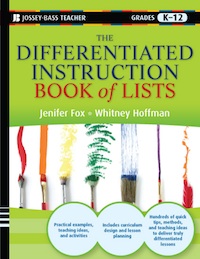Encouraging Learning
Seth Godin has a great blog post about ways we’ve classically looked at trying to help others do things, big and small. The key part I think all educators and parents should pay attention to is this:
The third method, the one that I prefer, is to open the door. Give people a platform, not a ceiling. Set expectations, not to manipulate but to encourage. And then get out of the way, helping when asked but not yelling from the back of the bus.
When people learn to embrace achievement, they get hooked on it. Take a look at the incredible achievements the alumni of some organizations achieve after they move on. When adults (and kids) see the power of self-direction and realize the benefits of mutual support, they tend to seek it out over and over again.
With differentiated instruction and personal learning, part of what’s asked is for teachers to set expectations, encourage, and get out of the way. Parents need to take this same attitude with grades and homework. Set expectations, guide and assist when needed, but basically get out of the way and let the child do it. Too often we fall into the trap that goading or nagging will work. Too often we take for granted that if giving the opportunity, the student just might make a good and reasoned decision. While I’ll be the first to admit kids don’t always have the experience or the frontal lobes to make the best judgments about what’s good for them now or in the future, if you lay out the case for them and provide all the facts and context, they can make surprisingly good decisions.
We need to develop a greater sense of trust in our students, in our colleagues, and in ourselves to do the right thing, most of the time. Too often I see people making plans, rules, policies and the like for the fringe operators, the people who will go out of their way to test limits or circumvent the system. Those people are never going to go away. They will always be there. The parameters need to be set for the bulk of people trying to do the right thing, and then deal with the outliers as outliers, as one-offs, as making human mistakes or bad decisions like we all do. Because some folks can’t be trusted, doesn’t mean we should all live in a police state. Instead, we have to set the expectation of trust and community, and if we do, the vast majority will follow.
Asserting authority should only have to be used when necessary. If you have a true learning community, it should be a trusting community as well, and you earn the respect and authority you have, as a teacher, parent or student. And this means not having to use your power or assert it very often, because it’s taken as a given, as a parameter of the interaction and group. This requires confidence in your position within the community as well, and that it will not be constantly challenged.
And I think this is really where many of us, including myself, fall short from time to time. You need to be confident and secure in your knowledge, your contributions and your place in a group in order to thrive. If you find yourself needing to assert your power and authority frequently, maybe you need to look at how secure you feel in your position, and whether or not the challenge you feel is internal or external. Sometimes it may be your lack of confidence that exacerbates the challenges to your authority, not a need for more and stricter rules.
Just something to think about.





